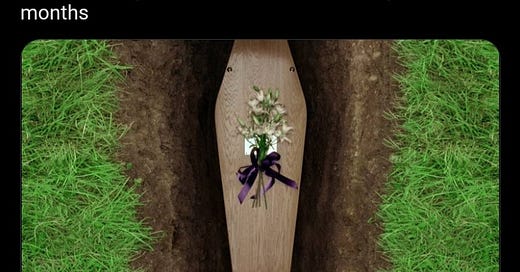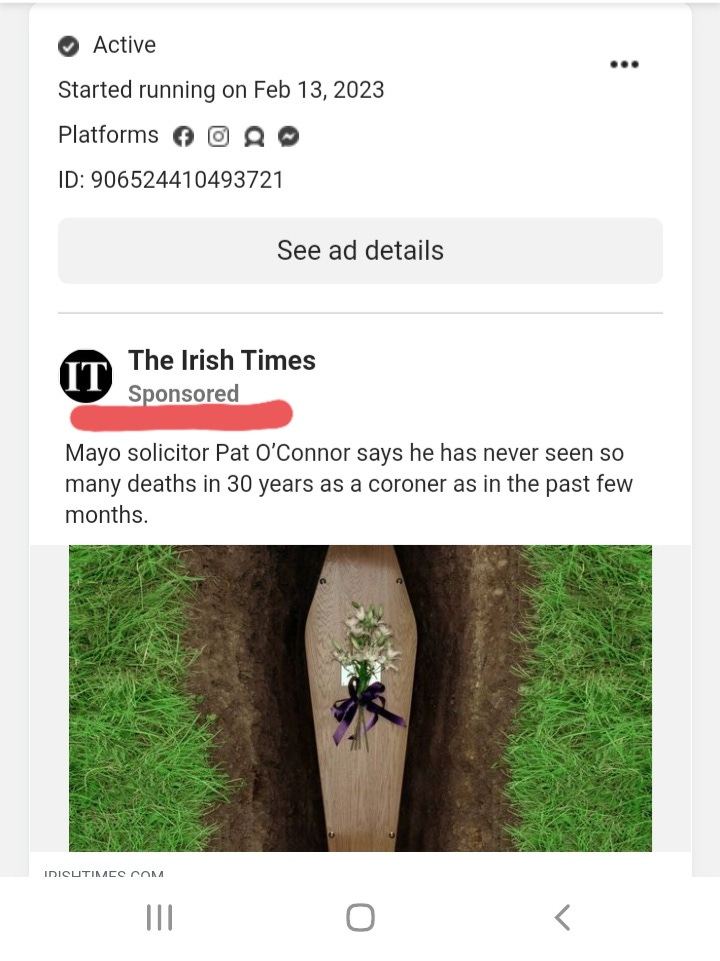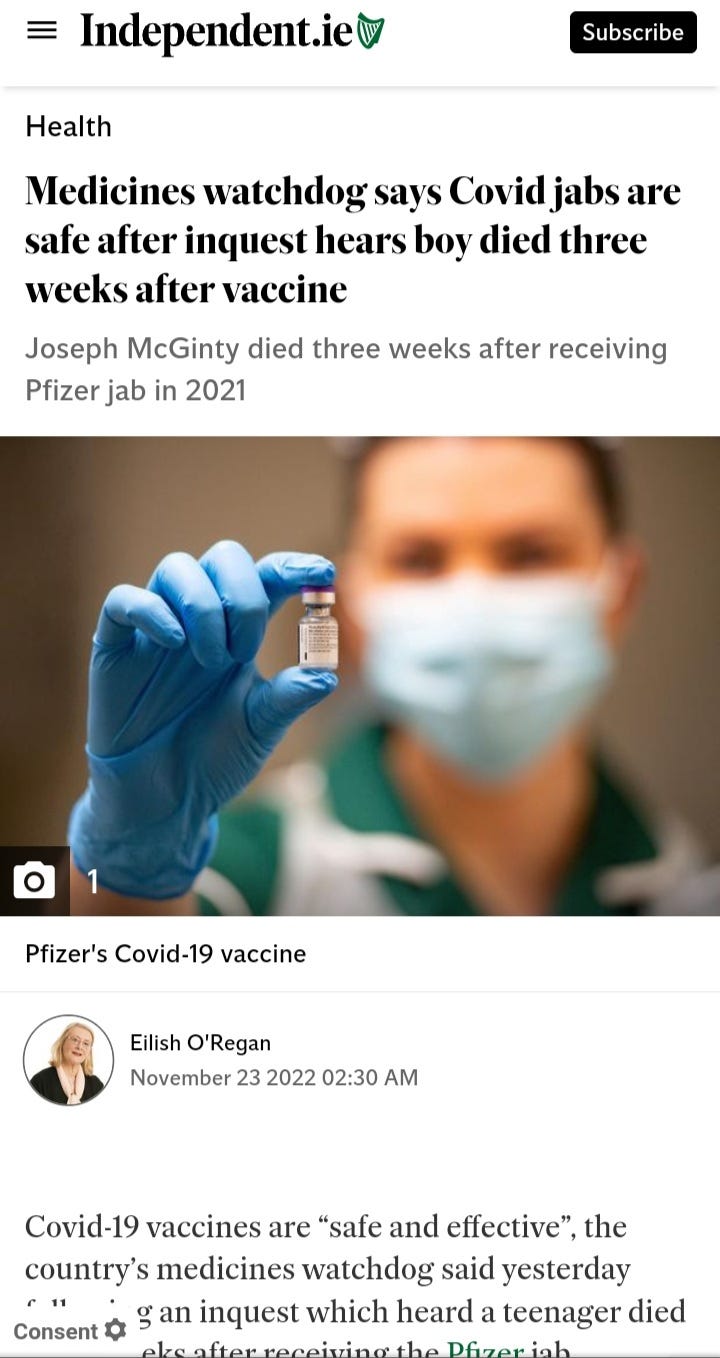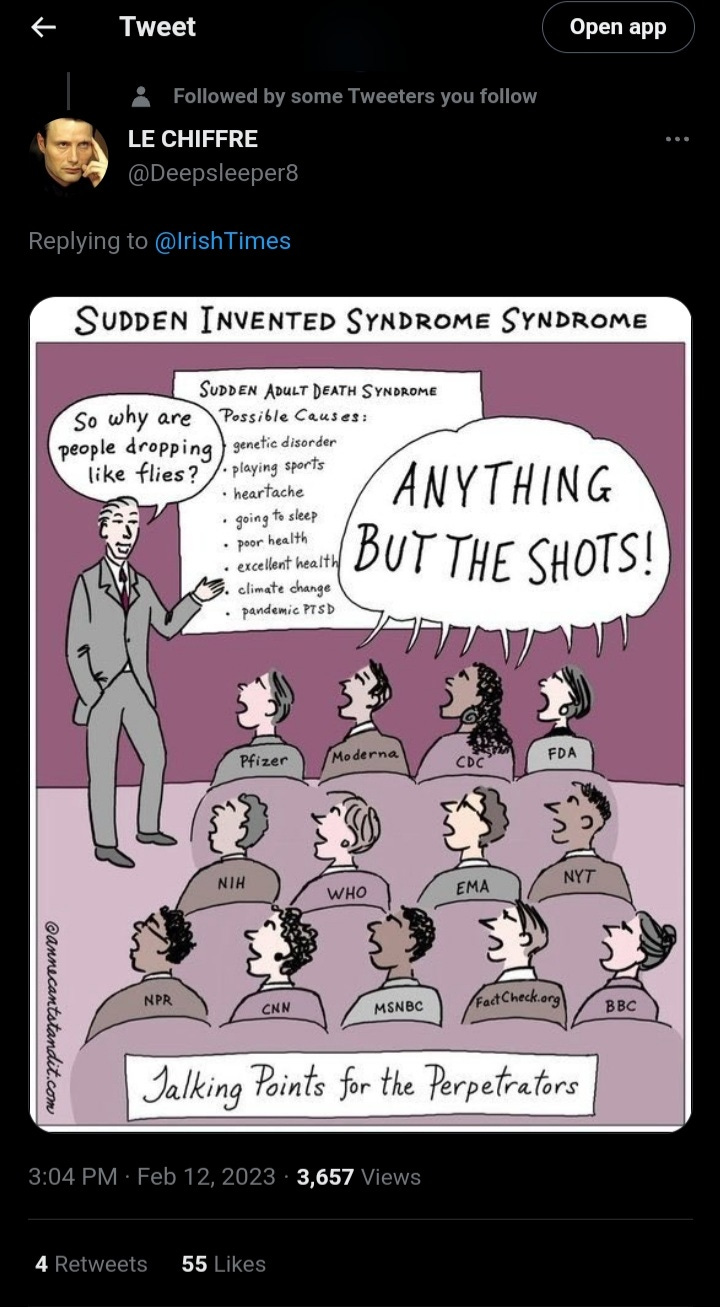Protesters blocked traffic outside RTE on Saturday, citing what they believe to be biased reportage on the topic of vaccines. On the same day, the Irish Times published the first article in a mainstream national newspaper raising the issue of covid 19 vaccines in relation to elevated excess deaths.
For the second Saturday in a row, the paper features commentary from Mayo based solicitor and coroner Patrick O’Connor. The Coroner appeared in a full page feature and photo shoot in the previous Saturday (February 4) edition.
These successive reports follow the Irish Examiner’s coverage of the topic of excess deaths, featuring Mr O’Connor on Monday January 30.
All of these column inches are a little curious because, none mention comments made by the coroner at the opening of an inquest into the death of a Joseph McGinty (14) from Achill Island three weeks post Pfizer vaccination.
Mr O’Connor described the death as ‘as a matter of significant public concern.’
“At this stage there is no causal connection between the administration of the vaccine and Mr McGinty’s death, that’s a matter that will be determined by evidence from those who give evidence before me at the inquest but it seems to me there is a matter of significant public concern to warrant an investigation and the opening of an inquest,” Coroner Pat O’Connor said.
The Irish Independent and the Irish Mirror published the report of the Achill inquest online (though it did not appear in either newspaper) and the article subsequently went viral across Ireland, the UK and the USA.
Neither the Irish Times nor the Irish Examiner opted to use that inquest report.
Curiously, throughout all of the fresh focus on Mr O’Connor’s concern over a rise in excess deaths, none mention his description of the boy’s death post vaccine as occurring “in circumstances the continuance or possible recurrence of which will be prejudicial to the health or safety of the public.”
The reportage further omits to mention the coroner’s request for vaccine safety trial data from Pfizer Ireland at a third preliminary hearing of the Achill case, on January 23 last.
Worth noting is the fact the Irish Times was promoting the excess deaths story as a sponsored ad on it’s social media over the weekend.
Is it interesting that the media is drawn to cover certain narratives arising from Mr O’Connor’s work and not others?
I am curious to know how much further coverage on the topic of excess deaths can go, before it deals seriously with one of the most obvious avenues requiring scrutiny.
Irish Times Health Editor Paul Cullen’s piece on Saturday is interesting for a couple of reasons.
Readers are alerted to the fact that there are doctors in the Irish medical system with ‘cause for concern’ over vaccine induced harm. Significantly, the reader is informed that these doctors, who harbour concerns are reluctant to speak publicly ‘for now.’
Cullen writes:
“While the vast majority of medical specialists we asked in recent months about claims of vaccine-induced harm say they have no cause for concern, it is fair to say that a small number of doctors do, though for now they are reluctant to speak publicly.”
What might cause a doctor to be reluctant to speak publicly of damage caused by a live public health policy that continues to be advertised across all forms of media?
The Mayo and Cork coroners have done the public a service in speaking out about elevated excess death rates. They have highlighted the problem that ordinary people are witnessing in their own localities in parishes across the country.
The problem is, the same media that fed and fuelled an extraordinary campaign of covid paranoia and fear may now have become a victim of its own success.
For the purpose of understanding why a cardiologist might not want to speak out about vaccine harm, I picked up the phone and called one.
He did not want to be quoted but gave his candid opinion, that in doing so he would be ‘attacked by trolls’ taken over by the narrative that the entire population needed to take a vaccine ‘in order to save granny’. He has seen evidence of vaccine harm, particularly following booster shots.
Now, we have a grave situation, whereby public health policy appears to be causing harm, but the issue cannot be properly dealt with by the media - according to the media.
Paul Cullen’s piece notes that the topic of vaccine adverse effects will be addressed in more depth at a number of upcoming inquests. These include the McGinty case and the Roy Butler case but no detail of these cases is mentioned.
“The issue is likely to receive an airing at a number of inquests into the deaths of people shortly after being vaccinated against covid,” he writes.
Why has this information relating to inquests into deaths post vaccine not appeared in the Irish Times? Does the public have a right to know of risks attached to vaccines they are actively advised to take, over and over, by public health authorities they trust?
I am not sure what entity has taken hold over my own profession, but it does appear that some malign force is not only discrediting journalism, but wiping out trust in the health system, particularly public health bodies such as the Health Products Regulation Authority (HPRA), which claims that even after a doctor signs off a death cert as due to covid 19 vaccine reaction, the vaccine may not have caused the death and the product is ‘safe and effective.’
Editors at the Irish Times are aware that there were multiple health professionals raising concerns within months of the vaccine roll out.
Not just the cohort of medics that were outright attacked for voicing their concerns; Dr Pat Morrissey, Dr Billy Ralph, Dr Gerard Waters. There were others.
Cullen and I worked together on a series of articles from concerned medical professionals citing what they believed to be vaccine induced harms they were witnessing in patients, back in June and July of 2021. These reports were written up and completed but never published.
One of the contributors, a nurse employed by the HSE, cited blood clots, tremors, neurological problems, chronic fatigue and persistent vomiting and diarrhoea among a list of issues she observed in patients post Covid 19 vaccination.
“We are seeing strange presentations post vaccination and we need to talk about this,” she said, back in 2021.
Check the HSE’s (updated March 2022) vaccine safety adverse events advice and note the overlap.
This nurse had declined covid vaccination herself, following advice from her fertility specialist as she was seeking to get pregnant.
“I don’t have any answers, I have questions. I want to be able to ask the question. I am worried that these conversations can’t be had. We should be able to thrash these things out and talk about it but if you mention vaccines, the conversation is over,” she said in a June 2021 interview.
“The people who should be monitoring this, don’t seem to be monitoring it. Stephen Donnelly, the HSE, Paul Reid. The media are not asking questions. There doesn’t seem to be any inquiry about what might be causing this.
“A 27 year old suffered a stroke 48 hours after the vaccine, that’s serious. I’m seeing neurological problems like confusion, unsteadiness on their feet, tremors in the hands, cardiac issues, blood clotting, warfarin levels going haywire after vaccination, loads of things and nobody seems to be asking any questions, it’s just ‘nothing to see here’. Mention the vaccine and it’s dismissed outright because they are deemed safe, but they are still in trial phase,” she said.
Multiple efforts to ascertain why this report was not published were met with silence.
In September ‘21, members of this nurses group shared their concerns in a meeting with TD’s, prompting the following comment from Cork South West TD Michael Collins.
“We need a voice out there for both sides. There is a voice out there to say vaccines are a great thing and the best of luck to people who found that. For people who became sick from or are unable to take a vaccine there is very little support out there and their voices are not being heard,” Independent West Cork TD Michael Collins said.
This article was flagged by Kinzen (founded by journalists Mark Little and Aine Kerr), the outfit hired by the HSE to monitor social media ‘misinformation’ on covid therapeutics and vaccines in 2020 and 2021. The controversial contracts for the Kinzen deal with the HSE were ‘lost’ according to the Department of Health, due to the cyber attack and found again following a parliamentary question submitted by Deputy Carol Nolan. Deputy Nolan told Gript that she believed the Kinzen saga had “effectively stretched credibility to breaking point.”
A look through some of the social media commentary on the Irish Times’ excess deaths story shows the newspaper’s credibility on this topic may also be stretched.
If there are senior doctors seeing evidence of vaccine harm, their concerns need to be aired. My next article will deal with potential concerns arising in Irish settings and examine ways to differentiate between the main avenues of exploration of the causes of excess deaths - covid 19, covid government policy and covid vaccines.
*
Warm thanks to those that continue to support my work, it is much appreciated.








Excellent work, thank you for your dedication and honesty.
Brave reporting with integrity! As part of the 'safe and effective' collateral damage and vaccine injured healthcare worker, I applaud you for giving this topic a voice 👏